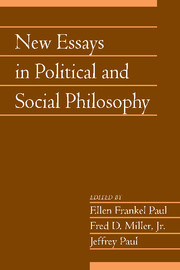Book contents
- Frontmatter
- Contents
- Introduction
- Acknowledgments
- Contributors
- Political Liberty: Who Needs It?
- State Coercion and Force
- Political Legitimacy and Economic Liberty
- Who Owns What? Some Reflections on the Foundation of Political Philosophy
- Human Reproductive Interests: Puzzles at the Periphery of the Property Paradigm
- Why Free Trade is Required by Justice
- Structural Exploitation
- Rescuing Justice from Equality
- Reinterpreting Rawls's The Law of Peoples
- Responsible Choices, Desert-Based Legal Institutions, and the Challenges of Contemporary Neuroscience
- Genocide and Crimes Against Humanity: Dispelling Some of the Conceptual Fog
- Harm and the Volenti Principle
- Education and the Modern State
- Index
Political Liberty: Who Needs It?
- Frontmatter
- Contents
- Introduction
- Acknowledgments
- Contributors
- Political Liberty: Who Needs It?
- State Coercion and Force
- Political Legitimacy and Economic Liberty
- Who Owns What? Some Reflections on the Foundation of Political Philosophy
- Human Reproductive Interests: Puzzles at the Periphery of the Property Paradigm
- Why Free Trade is Required by Justice
- Structural Exploitation
- Rescuing Justice from Equality
- Reinterpreting Rawls's The Law of Peoples
- Responsible Choices, Desert-Based Legal Institutions, and the Challenges of Contemporary Neuroscience
- Genocide and Crimes Against Humanity: Dispelling Some of the Conceptual Fog
- Harm and the Volenti Principle
- Education and the Modern State
- Index
Summary
I. Introduction
Contemporary philosophers, including many deliberative democrats, Rawlsian “high liberals,” civic republicans, and civic humanists have recently tended to endorse progressively stronger views about the value of the political liberties—the rights to run for office and vote. They tend to hold that citizens' lives will be stunted, and their status as human beings will be diminished, unless they have equal rights to vote and run for office. It has become more common to hold that these political liberties are of special importance, even more important and valuable than the civil or economic liberties.
In this essay, I challenge part of this trend. I argue that for most people the political liberties are of little value for the purposes of achieving the good life, securing their social status, promoting their preferred political outcomes, participating in the process of social construction, acting autonomously, achieving enlightenment and bettering themselves, and expressing themselves.
The claim that the political liberties are not very valuable is easily confused with other claims. Note the distinction between the following two questions:
Are an individual's political liberties typically valuable to that individual?
Are the political liberties valuable in the aggregate?
Questions 1 and 2 ask different things. Question 2 might have a positive answer even if question 1 has a negative answer. After all, suppose that democracy with universal suffrage produces the best expected consequences of any form of government. If so, then it would be valuable in the aggregate that citizens have the rights to vote and run for office. However, it might still be true that each individual’s political liberties are of little value to her. Consider, in parallel, that each of us is free to pursue advances in physics. Most of us are not clever enough to make much use of these scientific liberties, but we benefit from living in a social system where everyone has them.
- Type
- Chapter
- Information
- New Essays in Political and Social Philosophy , pp. 1 - 27Publisher: Cambridge University PressPrint publication year: 2013



